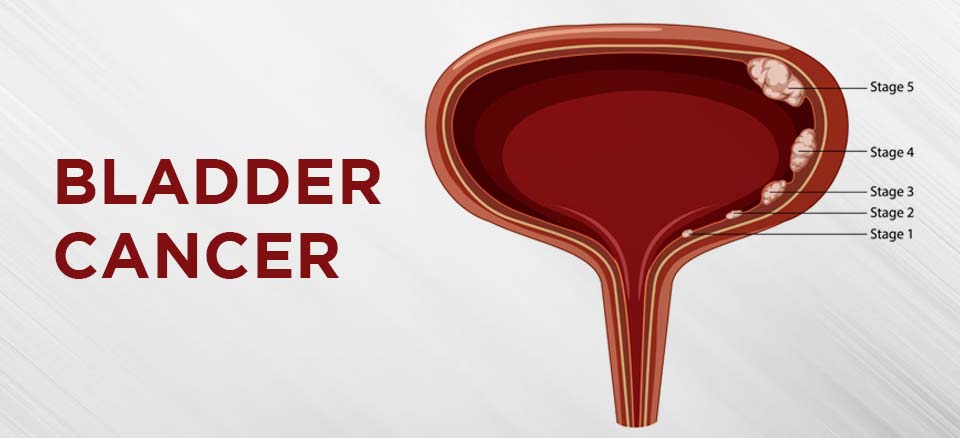


[vc_row][vc_column][vc_column_text]
Bladder Cancer is one the rarest forms of cancer that affects the lining of the bladder. It occurs when abnormal cells grow within the lining and start affecting the bladder. It grows into cancerous cells and starts reflecting symptoms. If bladder cancer grows and gets severe, it may affect the surrounding organs. To treat such conditions, a few technologically advanced treatments kill the cancer cells in your body. The Bladder Cancer Specialist tries to save the bladder and surrounding areas.
It is crucial to understand the symptoms and preventive methods to control the severity of this condition. Here are the most important causes, symptoms, treatments and preventions for bladder cancer.
The exact causes of Bladder cancer are unknown to the people, but there are a few risk factors that attract this disease. This cancer is caused due to various factors, and it is vital to understand. To take healthy measures to protect the bladder, understand the causes of bladder cancer first. The most common reasons are mentioned below-
[/vc_column_text][/vc_column][/vc_row][vc_row][vc_column][vc_column_text]
The body develops multiple severe and noticeable signs of bladder cancer. For early detection and successful treatment, it’s critical to understand the signs and symptoms of cancer. A few common symptoms consist of:
[/vc_column_text][/vc_column][/vc_row][vc_row][vc_column][lvca_accordion style=”style3″][lvca_panel panel_id=”Bladder Cancer Treatment” panel_title=”Bladder Cancer Treatment”]There is no lie in saying that medical science has uplifted the treatment methods. With their development, cancer has become a treatable disease up to some level. Treatment of bladder cancer varies based on stage and condition. The most popular treatment methods for cancer are surgical methods, chemotherapy, immunology and radiation therapy.[/lvca_panel][lvca_panel panel_id=”Surgical Intervention” panel_title=”Surgical Intervention”]Depending on the tumour’s size and location, surgical procedures can involve removing the tumour or, in more advanced cases, partial or complete bladder removal.
The most widely used method is the TUBRT surgical method to remove bladder cancer, in which a doctor performs specific surgery and removes cancer cells from your body. Surgical procedures also vary depending on the severity. If the cancer cells are not spread, then the Fulguration Method can also be used. It is a method where high electric energy is used to kill the cells. The fulguration method is called electro-surgery.
If the cancer cells spread to other parts of the body, the doctor may have to remove the bladder and surrounding areas. This treatment method is called Radical cystectomy. It is also a surgical method used in some severe conditions or later stages.[/lvca_panel][lvca_panel panel_id=”Chemotherapy” panel_title=”Chemotherapy”]It is a non-invasive technique to weaken the cancer cells. After chemotherapy is performed, doctors perform surgery to kill the cells. There are both invasive and non-invasive techniques for cancer treatment, surgical intervention, and therapies. The treatment approach depends upon the condition of the patient. This treatment uses drugs to target and destroy cancer cells. It can be administered before surgery to shrink tumours or after surgery to prevent recurrence. If the patient responds well to chemotherapy and then surgery, then they don’t need to look for another way.
Chemotherapy, leading to surgery, is the most common yet popular method to kill the cells permanently. Though cancer cells can develop again during your lifetime, you will get rid of it for once.[/lvca_panel][lvca_panel panel_id=”Immunotherapy” panel_title=”Immunotherapy”]This innovative approach harnesses the body’s immune system to target and destroy cancer cells. Immunotherapy has shown promising results in some instances of bladder cancer. Immunotherapy is an early-stage cancer treatment where Bacillus Calmetter-Guerin named medication is recommended. It boosts your immune cells and helps your body to fight against cancer cells.[/lvca_panel][lvca_panel panel_id=”Radiation Therapy” panel_title=”Radiation Therapy”]Radiation therapy is used to kill cancerous cells by combining other treatments with it. There are two types of radiation therapies- External Beam Radiation and Internal Radiation Therapy. In External Beam Radiation, a focused beam is targeted at the cancerous cells from outside the body. In Internal Radiation Therapy, the radioactive materials are put inside the body near the cancer cells. The doctors choose the treatment according to the patient’s condition.[/lvca_panel][/lvca_accordion][vc_separator][/vc_column][/vc_row][vc_row][vc_column][vc_column_text]
[/vc_column_text][/vc_column][/vc_row][vc_row][vc_column][lvca_accordion style=”style3″][lvca_panel panel_id=”Note” panel_title=”Note”]It is important to note that the amount and types of radiation vary from causing it to treating it. It is not similar to exposure, type and duration. Both the radiations differ from one another, and the bladder cancer specialist uses precautionary and safety measures.[/lvca_panel][/lvca_accordion][vc_separator][/vc_column][/vc_row][vc_row][vc_column][vc_column_text]
For bladder cancer, early discovery, diligent monitoring, and thorough treatment are required. The first stages in successfully treating this ailment are identifying the symptoms, comprehending the underlying reasons, and researching the available treatments. As a healthcare organisation, we provide the most excellent assistance and knowledge to support people on their path to greater health and well-being. Do not be afraid to seek a medical professional’s advice and contact the best urology hospital in Amritsar. Get the full assessment if you or a loved one are concerned or feel you may be experiencing symptoms.[/vc_column_text][/vc_column][/vc_row]
September 30, 2024
Recognize the Signs: Understanding Appendicitis Pain Symptoms
September 24, 2024
Unveiling the Truth: I-Pill Side Effects Every Woman Should Know
We use cookies to enhance your experience. By clicking "Accept", you agree to our use of cookies.